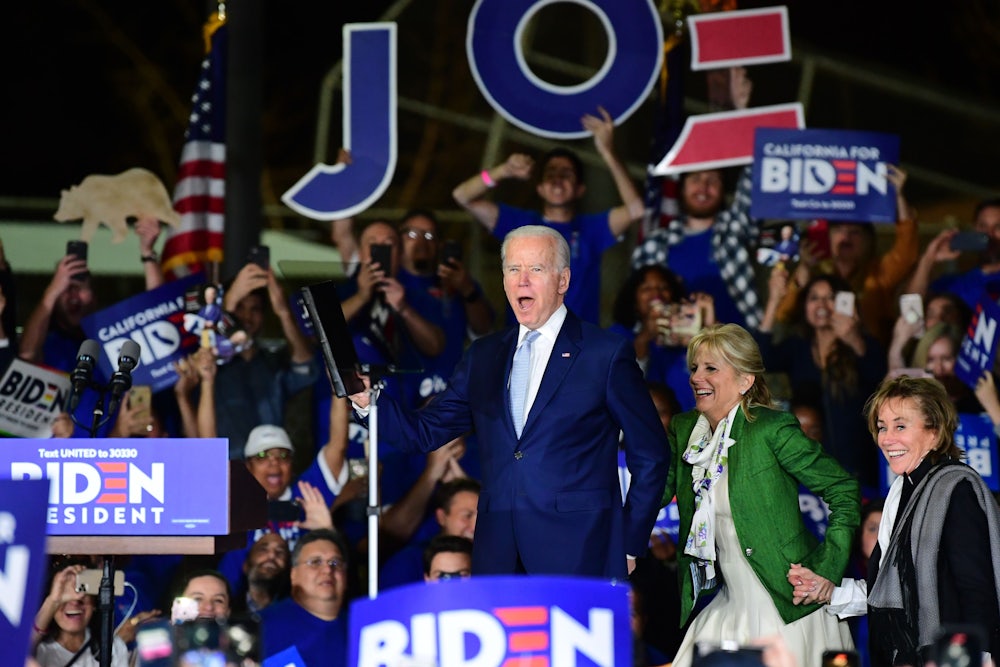Last month, his campaign stumbling, Joe Biden told a story about his deep, decades-long ties to social justice movements. “This day, 30 years ago, Nelson Mandela walked out of prison and entered into discussions about apartheid,” Biden told voters in South Carolina. “I had the great honor of meeting him. I had the great honor of being arrested with our U.N. ambassador on the streets of Soweto trying to get to see him on Robben Island.” It was a classic Biden story: self-aggrandizing but also personal, revealing his decency as both a man and a politician.
It was also, to borrow one of Biden’s favorite terms, malarkey. The New York Times noted that the anecdote appeared in none of Biden’s memoirs, including 2007’s Promises to Keep, in which he wrote extensively about his trip to South Africa. There were no contemporaneous reports in American or South African news outlets of Biden being arrested—odd, given that he was serving in the United States Senate when the alleged arrest occurred.
Biden later admitted that he had been “stopped” and “detained” but not arrested. This, too, made little sense—Soweto is nearly 1,000 miles away from Robben Island, so it was the equivalent of being “detained” in New York City for trying to visit someone in Minneapolis. It was the kind of fib that derailed presidential campaigns before, like Hillary Clinton’s claim in 2008 that her helicopter had come under “sniper fire” during a 1996 trip to Bosnia. The Mandela story was arguably more serious than the plagiarism scandal that prematurely ended Biden’s first bid for the presidency in 1987.
And yet Biden’s debunked story received little attention. When he appeared on all four Sunday shows after his landslide South Carolina victory—which came only a day after Biden admitted that he was never arrested—only Fox News’s Chris Wallace asked him about South Africa. The narrative had moved on. Biden wasn’t a liar, he was the comeback kid.
Biden’s huge Super Tuesday win couldn’t have happened without the machinations of Democratic Party leaders, who worked to get Amy Klobuchar and Pete Buttigieg out of the race and lined up a series of key endorsements. It also wouldn’t have happened without older, more moderate voters who remain suspicious of Bernie Sanders’s candidacy. But Biden also got a subtle boost from the media, which has largely ignored his many, many gaffes and liabilities—mostly because the media, particularly television media, was treating Biden as a has-been and his campaign as an afterthought.
Some Sanders supporters have suggested a kind of collusion between the Democratic “establishment” and the corporate media. With Sanders all but running away with the race, this thinking goes, elites jumped into action in coordinated fashion. Democratic politicians went to bat for Biden, while the media treated him as the emerging front-runner after South Carolina. This theory is more than just a conspiracy: It’s no secret that television punditry is filled with figures with long-standing ties to the Democratic establishment and that Sanders has few natural allies in the pundit class. Biden was treated with kid gloves, in part, because so many were desperate to find a viable alternative to Sanders.
Sanders’s rise also proved to be too juicy a story for many to ignore. Party elites were freaking out about Sanders, an outsider candidate who was upending the conventional wisdom. It was a huge political story, and, as a result, it was Sanders who came under microscopic scrutiny, not Biden.
But the biggest reason Biden was treated gently was that the media is addicted to simple narratives and biased toward covering whoever the front-runner is at any given moment. Before South Carolina, the story surrounding Biden’s campaign was that he had squandered his institutional advantages. He was the Jeb Bush of the 2020 race, someone who had all the right party connections but who could not connect with voters. If this guy was going to get humiliated anyway, why bother pointing out that he can barely string three sentences together?
We know, more or less, how Biden will be attacked by Trump in a general election, and how the media will cover him. Trump will relentlessly draw attention to Biden’s frequent verbal miscues, suggesting that he is not mentally competent for the job. He will cynically exploit Biden’s long, unsavory record as a legislator—his deep ties to the financial services industry, his role in unpopular crime and trade bills—to try to dampen enthusiasm for his candidacy. The media will follow his lead, sometimes for good reason. The doubts about Biden’s “electability” will return.
By that point, though, it might be too late. Biden is now the clear front-runner in the Democratic race. He got to this point thanks to a variety of factors—including the media ignoring him for just long enough that voters forgot about his flaws.
